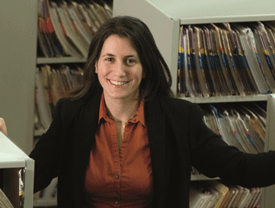Researchers at UMass Medical School and Worcester Polytechnic Institute are developing a stress-eating smartphone app that will help users better understand why they overeat, with the support of a $2 million award from the National Institutes of Health.
 |
|
| Sherry Pagoto, PhD | |
 |
|
| Bengisu Tulu, PhD | |
Development of the “RELAX” application and a pilot clinical study to evaluate its effectiveness will be led by Sherry Pagoto, PhD, associate professor of medicine at UMMS, and Bengisu Tulu, PhD, associate professor in the WPI Foisie School of Business, joint principal investigators on the grant.
“Most commercial apps available today focus on tracking diet and exercise, but do not help the user understand why they are eating so much and/or exercising so little,” Dr. Pagoto said. “Our clinical and research experience suggests that stress is a very common trigger for overeating and it is a barrier to exercise.”
RELAX will have two components: a mobile application that will enable patients to track their daily activities using a smartphone and a web-based tool clinicians can use to access patient information to help inform treatment.
“We want to use technology to help patients in real time, during their daily activities, and also to enhance the effectiveness of the time they spend face-to-face with their physician or counselor,” Dr. Tulu said.
Using text inputs, barcode scanning and GPS technology, the RELAX patient app will track eating patterns, daily activities, exercise, patient-mood and stress inducing events. The app will provide the patient with an itemized list of foods consumed, indicate the times of day identified as high-stress moments and illustrate the relationship between food intake and stress. The information collected will help the user to better understand his or her habits when it comes to emotional or stress eating.
For example, the patient-facing application will provide coaching for dietary choices or guided stress-reduction exercises to lessen the likelihood of overeating.
“Imagine a person driving into the parking lot of a fast-food restaurant, at a certain time of day, and getting prompted with a message asking them to think about what they are feeling and whether or not it is the right time to eat,” Tulu said.
Clinicians will be able to access their patients’ information collected through the RELAX patient app using the web-based application. The web tool will present information as easily digestible visual displays and feedback reports for the clinician to review.
During traditional weight-loss counseling sessions, time is often spent reviewing records and soliciting information from the patient about factors impacting their adherence, such as stress and stress eating. By using the RELAX web tool, clinicians can more quickly get to the heart of causal factors behind the patient’s eating habits, which can be difficult to identify using traditional counseling. The research team believes RELAX will help patients achieve better outcomes with fewer visits to their doctor or counselor.
The researchers hope the interactive design and the clinician’s ability to engage with the patient in a more data-rich way, both unique features of the RELAX application, will enable a more comprehensive approach to counseling patients about weight and stress management.
“We too often think of clinical problems in isolation and develop interventions focused on one problem,” Pagoto said. “The reality is that patients more often than not experience multiple issues that are very entangled. Just like clinical care, apps need to address the ‘whole patient’ to be maximally effective.”
RELAX is a three-year project. The first phase will establish the clinical and technical requirements for the mobile app and web-based tools. The second phase will cover technology development and usability analysis. The final phase will be a pilot clinical trial of the prototype RELAX applications with patients at UMMS and an analysis of the application’s impact on program delivery and costs.
“Part of our hypothesis is that the RELAX applications will result in a more cost-effective way to deliver this clinical program, so we also want to test that,” Tulu said. “The grant includes a rigorous business-case analysis of the prototype and pilot trial.”
RELAX is the latest in a series of collaborative research and development projects that blend the clinical and behavioral science expertise at UMMS with the engineering and computer science capabilities at WPI to help improve patient outcomes. Previous joint projects include development of a mobile application to promote weight management and a novel application and imaging system to help people with severe diabetes better manage their condition.
Also working on the RELAX program as co-investigators are UMMS faculty Edwin Boudreaux, PhD, professor of emergency medicine; James Carmody, PhD, associate professor of medicine; and Yunsheng Ma, MD, PhD, associate professor of medicine. The WPI co-investigators are Emmanuel Agu, PhD, associate professor of computer science; and Justin Wang, PhD, assistant professor, WPI Foisie School of Business.
Related links on UMassMedNow:
Diabetes management? Researchers creating an app for that